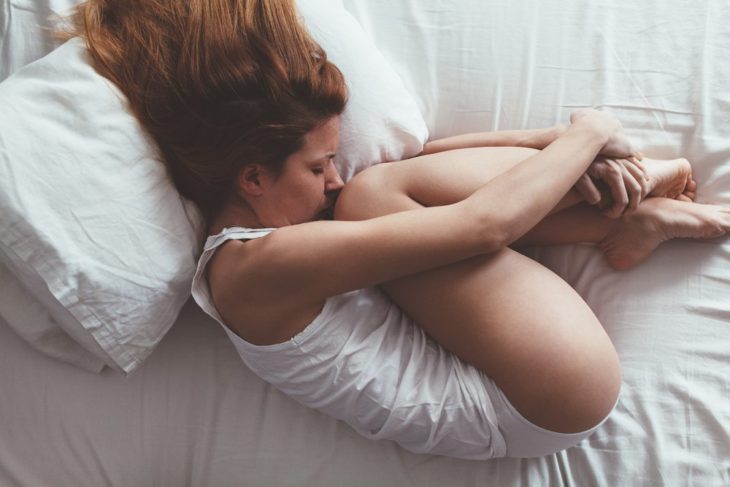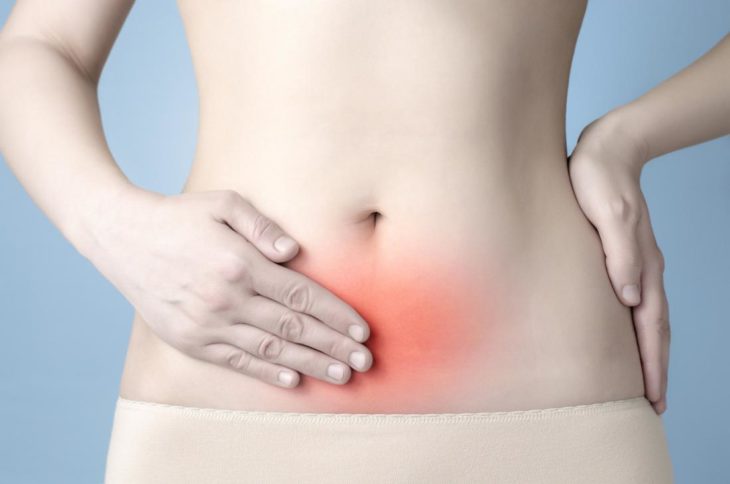Every kid in middle school played hooky. I was a total goody-two shoes, but still a hooky master—I told my mom I couldn’t go to school whenever I woke up sleepy, lazy or just hadn’t finished my homework. And then I turned 13 and got my period. As the Jewish tradition goes, my friend slapped me across the face in the bathroom, screamed “Mazel Tov!” and it all began. The cramps were unbearable. They felt like someone was punching me in the stomach. I couldn’t even think of using a tampon because I’d have to change it every 20 minutes—like Missy Elliott, my flow was out of control. But like the little boy who cried wolf, my mom didn’t believe that her star hooky player could have cramps that bad and sent me on my way to school. It wasn’t until a month later that my mom realized I wasn’t playing hooky—something had to be wrong when four extra strength Motrin and a heating pad didn’t help my cramps. My mom immediately made an appointment for me at her gynecologist.
My first examination was worse than expected. The stirrups, that scary metal speculum and a stranger putting their fingers inside of you is not so fun to begin with, especially at 13. But as soon as the doctor examined me, I felt an indescribably pain jolt through my body. I was in tears. My mom explained to the doctor that I was missing school at least two days a month from my period pains and uncontrollable bleeding. She also explained that she used to have similar symptoms when she was a younger, though she was never diagnosed with anything.

Source: TeachMeObGyn
My doctor had a strong hunch about what we both could be experiencing: endometriosis. Endometriosis is a condition in which the tissue that behaves like the cells lining the uterus (endometrium) grows in other areas of the body, causing pain and irregular bleeding. Endometriosis acts like velcro, sticking to organs and inflaming anything it sticks to. In extreme cases, it can cause infertility. The doctor explained that endometriosis is hereditary, but since it was only recently discovered when mom was my age, they probably didn’t know enough about it to diagnose her with it. There was a strong chance I had it, too. But the gyno explained that we would have to wait until I got a little bit older to be able to determine if that was the case, since there is no test for endometriosis. For the time being, my doctor prescribed heavy-duty pain medication and a birth control pill to help with my heavy and painful periods.
Years went by and sure enough, the pain continued. I tried eight different birth control pills and the Nuva Ring, but each method didn’t agree with me in some way—either it was too high in estrogen, or didn’t help the cramps, or didn’t stop the excessive bleeding. Nine birth control methods later, nothing helped.
As I got older, the pain wasn’t just during or before my period. I had a steady boyfriend and was sexually active. Sex started to hurt. As I finished my senior year, it began to hurt all the time. And not like it did when I lost my virginity—it hurt deep inside, so bad that I couldn’t enjoy it. I was with my boyfriend one afternoon and I’ll never forget that I started crying as we made love. I told him he had to stop because I was in too much pain. He was so upset, as if he was doing something wrong. But the only thing that was wrong was something that neither of us could help. My boyfriend was worried about me, my parents were worried about me, I was embarrassed, and, most importantly, scared. See, my dream is to have children. All I could think about was the fact that endometriosis could lead to infertility.

Source: Marjan Apostolovic/Shutterstock
I decided I was going to find a solution. I couldn’t stand not having a sex life, the crying all the time, and the constant worrying about what was wrong with me. I switched gynecologists. I thought an examination with a male doctor would be more uncomfortable, but he was all business and very thorough, which made me feel comfortable. After I explained how painful my periods are, how painful sex is, and how scared I was, he examined me and found that I was excessively tender. He recommended that I see an endometriosis specialist. I had a sonogram and an ultrasound, and showed up at the specialist’s office ready for an answer. But the right answer is never that easy to get. It took time but, sure enough, after some tests and an extremely painful examination, the doctor told me that she was 99 percent positive I do have endometriosis. She also explained that 84 percent of women who have endometriosis have interstitial cystitis, which is when there is a hole in the lining of the bladder. It is painful, uncomfortable and inconvenient, not to mention that it limits the foods you can eat. The doctor said that she would have to wait until I had the surgery to tell if I was one of this unlucky subset, but the chances were too high for my comfort.
Freshman year of college, I finally had surgery to remove the endometriosis. While the surgery can guarantee that the endometriosis will not grow back again where it originally was, it cannot guarantee it will not ever grow back in other places. The cells are tiny and very hard to see, so the surgery is complicated. I had laparoscopic surgery, which is through the belly button, and it took me a good three months to fully recover. I couldn’t have sex or be sexually active for four months, and I was left with five scars on my belly. If that weren’t bad enough, I was also one of the 84 percent diagnosed with interstitial cystitis.
But there was good news, too. The first time I had sex after the surgery was like a whole new world. I was no longer in pain. I was enjoying it and I felt, for a lack of better terms, like a virgin again.
Living with endometriosis has not been easy. I’m constantly scared that I won’t be able to have children. I’m scared it will come back, and while the surgery helped a lot, it’s been an ongoing battle. Because of the interstitial cystitis, I can’t eat or drink a lot of things and sex is still somewhat painful because my bladder is inflamed. It is so uncomfortable that I have to tell whomever I am with about my condition so they know to be gentle and understanding. And I am constantly going to the doctor for checkups to make sure it hasn’t come back.

Source: Medical News Today
Endometriosis may be debilitating, but it isn’t the end of the world. If you experience painful periods, heavy periods or painful sex, it’s important to go and get checked out by your gynecologist. It may not be something serious, but if it is, it’s important to get it under control. I got lucky and caught my endometriosis quickly, so it didn’t grow to a dangerous amount. But if you ignore it, like many things, it will only get worse over time. Also, it’s also very important that people who have endometriosis know that if you get surgery, cutting the endometriosis out will not guarantee that it does not come back in the same place. However, laser removal does guarantee that. If you have endometriosis or know someone who does, make sure their doctor uses a laser to ensure the best and most efficient results.
Although living with endometriosis is a pain in ass, with the support of my family and friends, fertility options for the future, and really good doctors who make sure I stay healthy, I’ll get past the pain and enjoy my life for what it is—awesome.
Original by Carli Alexa Blau
